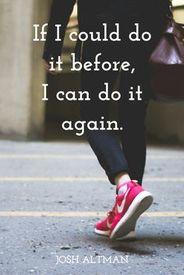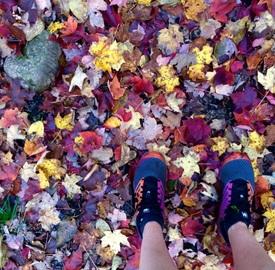March 2015 Running Challenge
Replies
-
Not sure if others have commented on this, but your improvement (dedication/determination) is impressive. Well done!
Thanks!! My first dog show of the season is in 3.5 weeks and the running has helped me not only lose some weight(20 lbs!) but it also will help me keep up with the dogs I show (white shepherds) which move very quickly. And I'm finding even as work is getting hectic and there's lots of training with the dogs, the running helps me relax and clear my mind and it's something I can control even when it's exhausting.
I have a big calendar on my wall that has all my runs stickered on it and my goal at the top of each month and the other day I was thinking even if I only stayed at 30 miles a month, how much that would actually be in a year. And to go from hardly running at all to building a habit of (right now) 3 days a weeks and actually planning my week for the most part around my runs. I'm feeling pretty awesome right now, and I will probably never get to some of the mileage you guys put up(which is amazing ps. ) but I'm making huge changes and I'm happy so I will keep chugging along. end of novel. Happy running! 0
end of novel. Happy running! 0 -
March 1 - 5K - 3rd place in my age group. Not my best time, but happy with it! 29:07
March 2- rest
March 3- 5.05 miles and strength training
March 4 - 5.09 miles
March 5 - 5.13 miles
March 6 - strength training
March 7 - 34 miles Biking - brutal winds today. I couldn’t keep up around the lake.
March 8 - 71 miles biking. Beautiful day out but that was too long.
March 9 - rest day
March 10 - strength training.
March 11 - 5.2 miles - knee felt fine! So thankful.
March 12 - 5.2 miles.
March 13- rest
March 14 - 10K
March 15 - 3.3 miles
March 16 - 4.4 miles
March 17 - Strength training
March 18 - 5.0423 miles
March 19- 5.12 miles.
Those of you with back pain are amazing to be running. I did something to my back a couple years ago and I could barely move for a week. The doctor told me I needed to strengthen my core. Didn't even know what that meant at first. But, that started me on losing weight, exercise and eventually to running. Now my core is strong! Sometimes I just push on it and can't believe it's mine!
Is the runner's high just something when you are running or does it last longer? I feel so good towards the end of the run and then on a high for hours later. Like right now, 2 hours after my run, I feel really happy/excited about ... I don't know what!
0 -
Date Miles today. Miles for March
3/1 6.5 miles - 6.5 <<<< 1.5 w/u plus 8K race
3/2 5 miles - 11.5
3/3 8 miles - 19.5
3/4 8 miles - 27.5 <<< new shoes today (ASICS Gel Noosa Tri 8's)
3/5 6 miles - 33.5 <<< TM intervals (ice covered streets)
3/6 8 miles - 41.5 <<< TM progressions @ recovery & easy paces
3.7 15 miles - 56.5 <<< Madkin and Weeden Mtns long run (1,299 ft elevation gain)
3/8 6.2 miles - 62.7
3/9 8.5 miles - 71.2
3/10 8 miles - 79.2
3/11 6.2 miles - 85.4
3/12 9 miles - 94.4
3/13 REST DAY
3/14 15 miles - 109.4 << Madkin and Weeden again
3/15 REST DAY
3/16 10.15 miles - 119.55
3/17 10 miles - 129.55
3/18 6.2 miles - 135.75
3/19 9.75 miles - 145.5
0 -
March 1: 5 miles Tread mill
March 2: 5 miles ™
March 3: 2 miles ™ + strength
March 4: 5 miles ™ no runners high today
March 5: Rest
March 6: 5.5 miles ™
March 7: skied with the kids at Gunstock
March 8: nothing
March 9: 7.75 miles OUTSIDE!
March 10: Pump
March 11: Nada
March 12: 5.3 Miles OUTSIDE! woo hoo, so dam hilly and windy, but felt great :-)
March 13: Nothing
March 14: Nothing
March 15: Nothing
March 16: 10.25 outside. great!
March 17: Pump
March 18: 3.75 outside with friend+ 1 ™
0 -
 0
0 -
Sorry to hear about all the back troubles out there. As many have mentioned, it doesn't seem like folks with back problems truly recover, they just learn to manage as best they can.
I was wondering if anybody out there has hit a bit of a running wall before. Last November-December, I was running 20-23 miles a week. Usually three 3-6 mile runs and a longer run on the weekend (7-11).
Over the past few weeks it's seemed like every run is a bad. I find myself struggling to get to 3 miles and feel like I'm forcing every steping beyond that. My 'cruise speed' was 9:30 minute miles and I felt like i could click those off pretty easily.
Now I'm running 11:00+ miles and really trying to push. Travel or work impacted my schedule. I had dropped to 3 days per week. I'm hoping adding more miles is the solution.
I also wonder if diet is playing a role. I had been eating 100% clean. No processed food, empty carbs, refined sugar, booze, soda or caffeine. But as I approached my I goal weight, I admit a lot of my calories are empty
My first HM is next month and I feel like I'm regressing instead of peaking.
Thanks in advance
I second the look at the carbs. My best runs are on sugar and caffeine. I've lost a few pounds then slack on eating clean too, now I've gained it back...
Do you track your runs with an HRM? I'm no expert, but I've found that sometimes my runs/bikes that feel really hard has been because I was pushing harder. Evident by comparing metrics. And I'm sure its to be expected as our bodies adjust. Training seems to be sinusoidal, not linear.
@SBRRepeat I did the point thing for a while. I thought it was keen.0 -
@Elise4270 sometimes I'll check my food diary against it, just to see how I'm doing. I'm terrible with portion control and just know I would end up eating waaay too much "good food" and eyeballing portion sizes, which is how I got to be fat in the first place.
I actually struggle with eating as many carbs as he recommends. With my training schedule, it should be around 3.75 grams per LBM pound, not including workout nutrition. How would anyone eat almost 500 grams of carbs in a day? (Rhetorical question, 2011 me would probably have some ideas)0 -
I have been sick and unable to run for over a week, so there is no way that I am going to meet my goal this month. I ran last night and it didn't go well. I guess I haven't recovered as much as I thought I had. On the plus side, I am coughing a bit less today. I'll rest for a day or two more then try another short run and hopefully I'll be good for this weekend's 10k. Now my goal is to get over this crud and get back into half marathon training. My next half is in a month!

0 -
Sorry to hear about all the back troubles out there. As many have mentioned, it doesn't seem like folks with back problems truly recover, they just learn to manage as best they can.
I was wondering if anybody out there has hit a bit of a running wall before. Last November-December, I was running 20-23 miles a week. Usually three 3-6 mile runs and a longer run on the weekend (7-11).
Over the past few weeks it's seemed like every run is a bad. I find myself struggling to get to 3 miles and feel like I'm forcing every steping beyond that. My 'cruise speed' was 9:30 minute miles and I felt like i could click those off pretty easily.
Now I'm running 11:00+ miles and really trying to push. Travel or work impacted my schedule. I had dropped to 3 days per week. I'm hoping adding more miles is the solution.
I also wonder if diet is playing a role. I had been eating 100% clean. No processed food, empty carbs, refined sugar, booze, soda or caffeine. But as I approached my I goal weight, I admit a lot of my calories are empty
My first HM is next month and I feel like I'm regressing instead of peaking.
Thanks in advance
How were your runs during January and February?
Has your weight increased since December? Are you getting adequate sleep/rest with your workload/travel? Are you constantly stressed out from work?
Like others have asked, how is your carb percentage compared to your other macros? A car must have gas in the tank before it can really go anywhere..
I ask all of the above because they play an important role in running effort.0 -
Interesting article about the effects of cold weather running.
How Cold Weather Impacts Your Running
Matt Johnson | December 1, 2014 | 15 Comments
http://runneracademy.com/cold-weather-impact-on-running/
Just as hot, muggy summer days have a detrimental effect on your running, cold weather has an impact on your running performance as well. Unfortunately less attention is given to cold weather performance than hot weather so many runners do not train with this knowledge.
The effects of hot weather on your running are quite clear – you will need to slow your pace, put very focused attention on hydration, and watch for warning signs of heat exhaustion.
In short, your performance in hot temperatures is not the same as it would be on an optimal 50°F day. You’ll run slower and maybe not able to run as far as you planned.
But what about cold temperatures? How much is your performance impacted? Is it safe? Can your lungs freeze? Humans are actually warm weather mammals and we only thrive in colder climates with clothing and ability to shelter ourselves from prolonged exposure to the cold.
As a result there are impacts to your running when the temperature drops, but they are for different reasons than hot weather performance declines.
Impact of Cold Weather on Performance
As the temperature decreases below 50°F your performance can be subject to decline. The good news is that the difference is negligible as long as the air temperature is above freezing 32°F/0°C. At an air temperature at the freezing point, you can expect just a 1-2% increase in your pace per mile. As the temperature drops, the impact to your performance becomes more noticeable:
The reason for the increased pace is three fold.
Reduced Muscle Contractions
At colder temperatures your muscles do not contract with the same intensity as they do in warmer temperatures. As the temperature gets colder your nervous system that transmits the impulses to move your muscles slows down. Since your muscle contractions are not as powerful as they are in warmer temperatures you slow down as a result.
The cold can also reduce the blood flow to chilled areas of your body. Cold muscles can’t perform at the same level as a muscle that is warm.
Changes in Energy Sourcing
The second reason for increased pace is how your body uses energy at lower temperatures. As the temperature drops your body increases carbohydrate consumption as a source of fuel and reduces the reliance on fat consumption. As carbohydrates are an important source for energy for distance running you drain your reserves faster than you would at warmer temperatures.
Your body also becomes less efficient in using oxygen as a fuel source resulting in more oxygen being used in cold conditions compared to the same effort in ideal conditions.
Increased Lactate Production
When running your body either operates in an aerobic or anaerobic state. In an aerobic state your body uses oxygen as a primary fuel source and it is very efficient in producing the energy needed for running.
When your pace is faster than your body can sustain aerobically your body taps the anaerobic system which does not use oxygen but instead breaks down carbohydrates to create lactic acid to fuel your running until a point is reached where the lactic acid build up slows your pace due to excess hydrogen byproducts.
As mentioned above your body consumes carbohydrates faster at lower temperatures which increases lactic acid production as a consequence. Since carbohydrates are burned faster at cold temperatures this increases the pace per mile that is sustainable at a given temperature. This is in addition to the disadvantage of having less efficient oxygen usage.
Other Performance Considerations
In addition to your pace per mile being negatively impacted, there are other impacts to your performance when the temperature drops.
At lower temperatures your body has to work harder to maintain your core temperature. The result of this is more energy has to be expended simply for maintaining core temperature compared to ideal conditions or warm weather. This increased energy consumption comes at the expense of your running performance as less overall energy is available. Quite simply there are more demands for the same amount of available energy when it is cold.
When running in cold conditions it is important to keep your muscles warm and your core temperature maintained at all times. If you become chilled on a run or allow yourself to cool down for any length of time your body is unable to get back to the prior temperature without returning to a warmer environment. As a result, your performance will suffer.
This is critically important when starting a race. If you head into the cold and do not keep yourself warm and ready to go but allow yourself to cool down you will be at an even greater disadvantage that cannot be overcome. Allowing yourself to get to the point of shivering will quickly rob your body of energy as shivering is produced by your body engaging in the most inefficient muscle contractions it can to generate heat.
Hydration needs are impacted in colder conditions. When the temperature drops your blood pressure rises as your blood flow is constricted. To counter this your body removes excess water in the form of urine. In colder temperatures you do not sweat as much and your body does not trigger thirst the same way it does in warm conditions. As a result, it is very easy to become dehydrated.
Minimal intake of fluid can cause the feeling of needing to urinate, even if it is a small amount.
The same rules apply for hydrating in cold weather as in warm weather:
Safety Considerations
Running in the cold requires paying attention to signals from your body. Unlike in warm weather if you become overheated you can slow or stop activity to prevent heat related illness or heat exhaustion. In cold weather, the onset of hypothermia is a real risk and can only be treated by warming the body by immersing yourself in warmer temperatures. Advanced signs of hypothermia include slowed or slurred speech, loss of concentration and loss of coordination.
There is also the risk of frost nip or frost bite, especially in very cold conditions where sweat can freeze to the skin.
Many runners fear that in very cold temperatures their lungs or airway tissues can freeze and cause damage. Some runners experience pain or stinging in their lungs when exercising in the cold.
Fortunately this is one concern that is largely unfounded. Your body is incredibly efficient in heating air before it makes it to your lungs so the risk of sub-freezing air killing tissue or freezing your lungs is not a concern. But some do struggle with breathing in cold weather.
Much of the time this is due to dry air being inhaled rather than cold air. You might try inhaling through your nose as much as possible or purchasing a running mask to help warm and moisten the air before you inhale it.
By knowing the impact of running in cold weather, you can plan your training, racing and pacing effectively and set realistic expectations for your performance. You can’t control the conditions, but you can optimize your planning and approach.
0 -
Another article talking about diet for runners. (part 1)
The Power of Diet for Runners: How to Eat for Endurance and Lose Weight Effortlessly
by Jason Fitzgerald
http://strengthrunning.com/2012/05/diet-for-runners/
This is what happens with a Wholefoods gift card. I go crazy like a kid in a candy shop – or like a food fanatic who can’t control his craving for healthy, delicious snacks.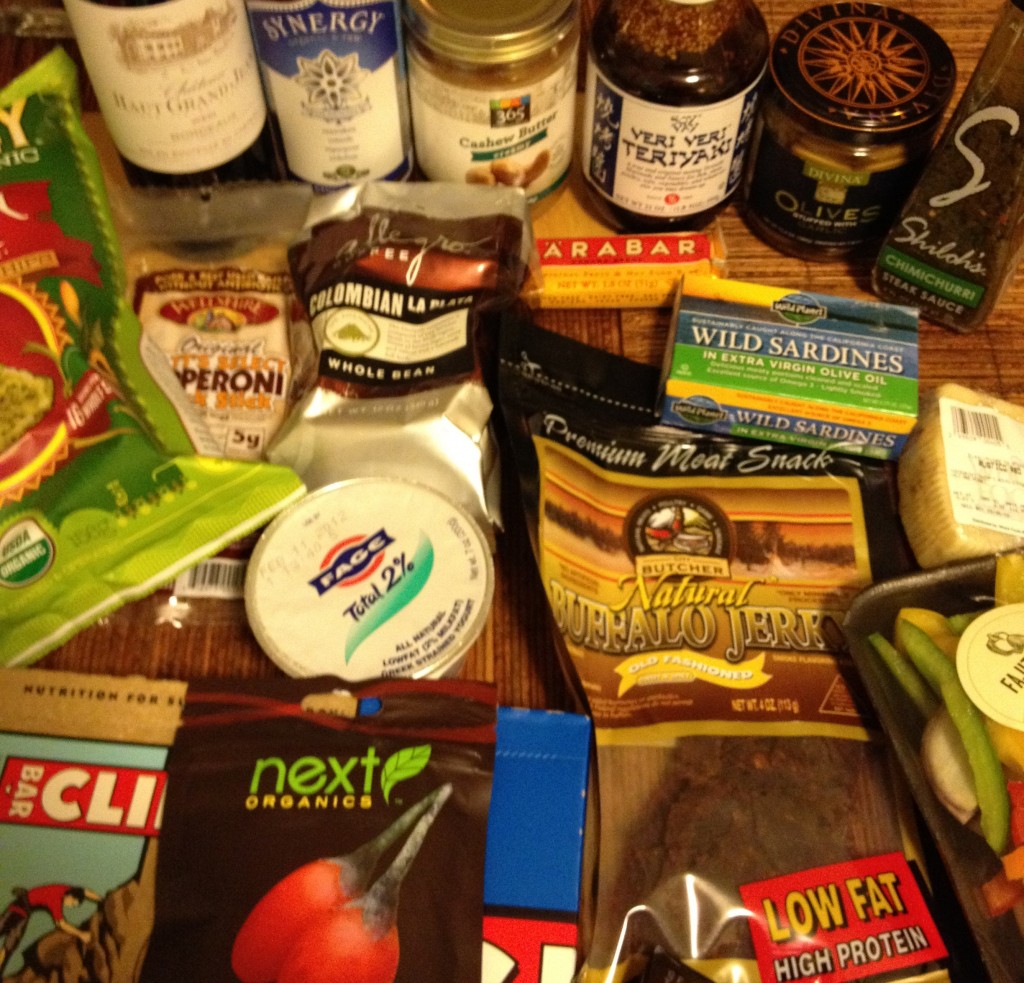
But I used to be a glutton. Being naturally skinny, I never had to worry about eating crappy food because I never gained an ounce. Running throughout high school and college only reinforced my bad eating habits. I had no idea what a healthy diet for a runner should look like.
It’s somewhat embarrassing, but I want to tell you a quick story about my favorite time of day as a freshman in college. You might be thinking, “Saturday night!” or “Race day!” or maybe even “When Jason had class with that hot girl he had a crush on!”
Unfortunately, none of those are true. Being 99% residential, Connecticut College had a damn good dining hall and an unlimited meal plan.
Every day, I looked forward to dinner after cross country practice like a normal person does with Christmas. I had also learned that the human body doesn’t register the feeling of fullness or satisfaction from a meal until about 15 minutes after you start eating. So I loaded my tray with a big plate, several smaller plates, and at least one bowl – all full of food.
Then the eating would start. I literally loved to stuff my face full of whatever they were serving:
•chicken breast sandwiches with double cheese, ranch dressing, and bacon
•pepperoni pizza dipped in ranch dressing
•barbecue pork subs with french fries
•pasta with meat sauce and melted cheese
•hot dogs, cheeseburgers, and more Lucky Charms than is reasonable or sane (I LOVE cereal)
Clearly, I had a problem. I was like the sheltered home-schooled kid who went buck wild and couldn’t contain his partying once he was set free from the parental leash. Except with food.
Fast forward to February of my Senior year. I had a physical over Winter Break and my lab work came back with a startling result: my total cholesterol was at 211 (under 200 is considered healthy) and my LDL and HDL levels were all out of whack.
After over 22 years of pristine health, I came to the unfortunate conclusion that I was not immune to the side effects of a *kitten* diet. Despite a healthy weight of about 132 pounds for my height of 5′ 7″ and high levels of exercise, I wasn’t as healthy as I could be.
The saying, “If the furnace is hot enough, it will burn anything” isn’t quite true – it clearly wasn’t burning through the excess cholesterol floating through my body. While cholesterol isn’t a great indicator of overall health (I now think slightly high cholesterol isn’t something to worry about), it made me realize that I needed to make some changes.
Change Your Food Mindset
Over the years, I’ve refined how I think about food and the best diet for runners. Personally, I don’t believe in traditional diets – unsustainable cuts in calories, dramatic changes in eating habits, and a refusal of anything that might be considered unhealthy.
I don’t consider that fun nor do I think it’s the best long-term solution for weight management or optimal health.
With training being consistent over the years, what’s changed to help improve my blood panel, racing weight, and strength to weight ratio? I certainly haven’t been on a diet for the last 6 years. Instead of a restrictive meal plan, I’ve developed a new mindset about food.
It helped improve my total cholesterol from 211 in 2006 to 184 in 2010 (measured again at 185 five months later). My racing weight is about five pounds lighter at 127 today – even though I’m a lot stronger.
I still eat almost whatever I want – but I pick my battles. What’s changed is that I now understand what’s good for you and what’s not. Before I never knew! I’ve learned from:
•The Primal Blueprint by Mark Sisson
•In Defense of Food by Michael Pollan
•The Omnivore’s Dilemma: A Natural History of Four Meals by Michael Pollan
•Fast Food Nation by Eric Schlosser
•The Four Hour Body by Tim Ferriss
•The Paleo Diet for Athletes by Joel Friel and Loren Cordain
•Fat Head starring Tom Naughton (movie)
Food is delicious and should be a great pleasure in life. I’ve learned that you can eat almost anything if you follow a set of simple rules when deciding what to eat and when
Diet for Runners: The Top 5 Food Rules to Live By
I’m usually not a fan of “rules” that deny you things that you enjoy. Yet these five principles of healthy diet for runners can dramatically help you change your eating habits for the better without much sacrifice. I’m a realist when it comes to diet but these rules might just change your life.
1. Stock up your house with real food. The term “real food” means minimally processed with as few ingredients as possible. Think:
•High-quality meat (local, organic, or grass-fed if possible)
•Vegetables
•Fruit
•Beans
•Nuts
•Wild rice or quinoa
Take a look at the pictures in this article – this is what I eat for dinner.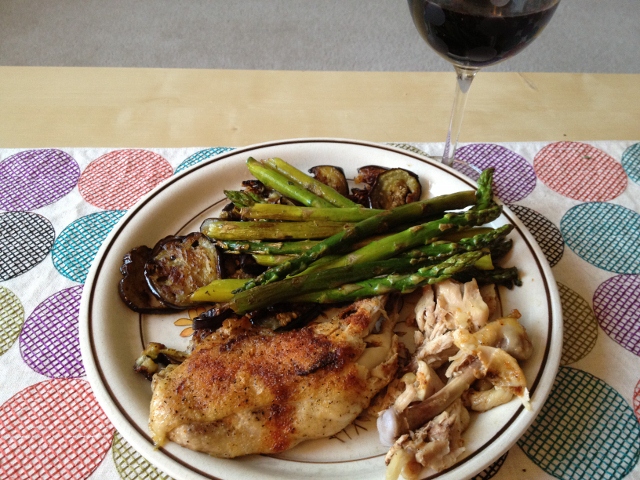
By stocking up on real food, you’ll need to get rid of all the processed stuff and junk food. Here’s your chance to have some fun: don’t throw it away, eat it! Have a cheat weekend where you only eat junk food and processed food.
Not only will you rid your home of unhealthy food, you’ll be craving the healthy stuff.
2. Don’t be a zealot – cheat on your diet regularly. Perfection can be the enemy of the good and you need to let yourself enjoy food that you love. What you usually do is more important than what you sometimes do.
Remember that your diet can be more flexible after long runs or hard workouts. Your body is craving more calories and carbohydrates so cookies, a cheeseburger and fries, or slice of pizza can actually be a good thing.
I usually have a bowl of ice cream every night. And I love it – no regrets.
3. Cut back on your sugar intake (but be realistic about your carb needs as a distance runner). Every runner knows that carbohydrates provide the best fuel for running and that most runners don’t carbo-load for the marathon properly.
But on a day to day level there’s no need to consume so much sugar. Do you really need a 32 ounce Gatorade after your easy 5 miler? Are two plates of spaghetti necessary on a day you didn’t run at all? You know your body best but if you’re struggling with weight issues then excess carbs could be the culprit.
4. Vegetables are the best food group for you. They’re calorie poor, nutrient dense, and usually have very little sugar. You should try to eat at least two servings a day.
My challenge to you: have 1-2 servings of vegetables at every meal for a week. Here’s how.
•[Breakfast] Whole-egg omelette with chopped mixed vegetables
•[Lunch] Big *kitten* salad
•[Dinner] Paleo spaghetti with chicken breasts and a side of wild rice
5. Enjoy your food! Try new things, cook differently, use wacky spices. Sautee your vegetables instead of boiling them. Bake them instead of sauteing. Use a crock pot instead.
Get a spice sampler to make sure you experiment with new flavors. Or, try ordering some different types of meat from a reputable vendor.
Food can be a fantastic way of exploring the world. Don’t let yourself get stuck with the same 4 meals.
0 -
(part 2)
The Power of Diet for Runners: How to Eat for Endurance and Lose Weight Effortlessly
by Jason Fitzgerald
http://strengthrunning.com/2012/05/diet-for-runners/
My Typical Daily Diet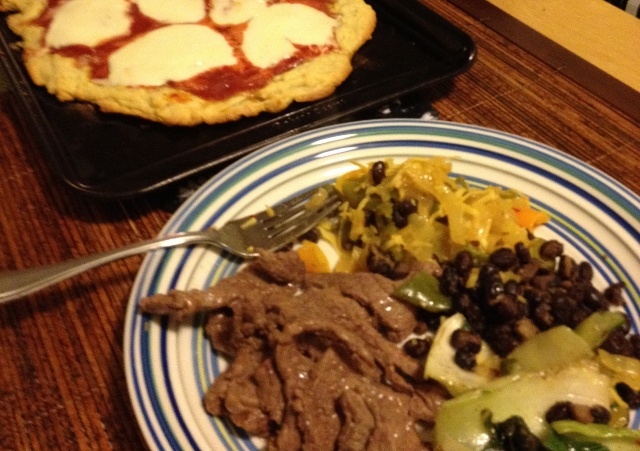
Marathon Training Meal: homemade pizza, sauteed beef, bok choy, black beans, mixed vegetables in coconut oil
Eating right doesn’t have to be difficult or a chore to plan. I enjoy the process of cooking and usually only spend 30-45 minutes preparing dinner.
There’s no single best diet for runners, but this is what my typical daily diet looks like.
Breakfast and mid-morning snack
•Banana, coffee with whole milk, two whole eggs scrambled with mixed vegetables and cheese
•Handful of cashews and a serving of full fat Greek yogurt with honey
Lunch and mid-afternoon snack
•Small spinach salad with cheese, cucumbers, shredded onions, and carrots
•Leftovers: sliced chicken breast, mixed vegetables sauteed in olive oil
•Cottage cheese
•Apple
•Peanut M&M’s (my Kryptonite) or a few pieces of dark chocolate with almonds
Dinner and post-meal snack
•Chips and guacomole or pita chips and hummus
•Baked eggplant in olive oil, pan fried asparagus, ground beef with beans
•Bowl of ice cream
•1-2 beers or glasses of wine
Damn I eat a lot. I’ve never kept a food journal but I can see why it can be so valuable! Just by writing down my typical daily diet I see that I eat a lot of dairy. It doesn’t bother me but it can cause stomach issues for some who are more sensitive to lactose; be careful with all the cheese, milk, and ice cream.
It’s also important to distinguish between “typical” meals during regular training and meals during heavy marathon training. The picture in this section is a “marathon meal” – with a homemade pizza and black beans. During periods of heavy volume I’ll try to add 2-3 more servings of carbohydrates per day.
I usually stick to better sources than pizza like quinoa, wild rice, beans, or whole-grain bread. But I’m not too picky when I’m preparing for a 22 miler with 9 of those miles at Marathon Pace.
3 Diet Hacks for Runners: Performance, Weight Management, and Recovery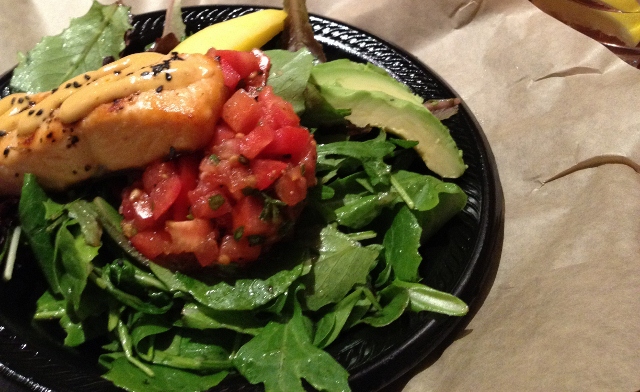
High fat, low carb: arugula salad with tomatoes, salmon, avocado
There are three “hacks” or diet strategies that you can use for specific situations in your training. I use these depending on where I am in my training cycle, how I feel, and my goals at the time. You can too.
How to optimize performance: If you have a big workout or long run planned that you really want to nail, you can make a few tweaks to your pre-run meal to help you kick *kitten*.
First, make sure you’ve eaten enough carbs. Right before you run it’s fine to eat simple carbs (like pancakes or toast) since you’ll be using it very soon as fuel to run fast.
Second, drink some coffee to help you feel better and run faster during your workout. Be cautious if you don’t normally drink coffee since it can…ahem…make you need a bathroom. If you’re used to its effects, 1-2 cups about an hour before your workout can help you run faster by improving focus, changing how your muscles contract, and blunting your perception of pain.
Make another fresh pot! Giddy up! [Click here to tweet this, you caffeine addict]
How to lose weight: Being at your goal weight is an important part of running well. You’ll only run slower if you’re carrying unneeded pounds so determine your optimal weight and make it your mission to get there.
A simple and relatively quick way to drop unwanted weight is to eliminate almost all sources of carbs from your meals. A Paleo diet isn’t 100% compatible with heavy training but you can do it while running easy for most of your workouts.
If you are running a lot, I highly recommend The Paleo Diet for Athletes for advice on how to time your carb intake to fuel your workouts (not your thighs).
How to avoid over-training: The feelings of over-training can hit you like a sledgehammer: fatigue, soreness, lethargy, and poor performances in your running workouts. But to quote Mark Sisson, “Sometimes, over-training is actually just under eating.”
Food is fuel and if you’re not giving your body what it needs it won’t recover and heal itself. You’ll feel the consequences during your next run. One of our RYBQ members was dealing with this issue while simultaneously trying to lose weight by restricting her diet and training for a marathon.
You can’t do both. If you’re feeling worn down and overly fatigued, cook a few hearty meals and eat more than you normally would. And of course, sleep is the best recovery tool you have so get a lot of it. After a few days you’ll probably feel refreshed and re-energized to tackle your running.
What now? 3 Ways to Reinvent Your Diet Today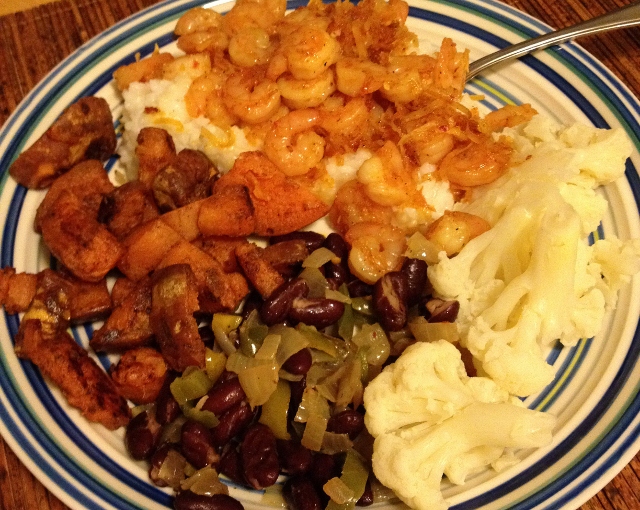
I want to leave you with three action steps that you can do today to improve your diet.
1. Recruit your team. Whether it’s your roommate, husband, mom, dad, wife, or girlfriend – you need a support team to kick *kitten*. They’ll remind you of your goals and keep you in line when you start to stray. Make sure they’re not bringing boxes of Lucky Charms into the house or – if you’re like me – you’ll eat a box in one sitting.
2. Clean out your fridge, freezer, and food cupboard. Yes, you can do that by eating all that gross stuff. This is your last hurrah. Enjoy it. It’s just too hard to stick to healthy, whole food if you have a package of Chips Ahoy in your cupboard.
Once all that junk food is in your stomach, you need to replace it with the good stuff. That leads to #3…
3. Make a “master” shopping list. A master shopping list includes all of the essential items that you’d buy at the grocery store. It’s not necessarily what you buy every time you go shopping – but it’s what you refer to if you need ideas on what to buy.
Keep it handy and use it to create smaller lists of things you need on a weekly basis.
To help you out, I’ve created a massive master shopping list that’s available in the Runner’s Gear Bag. It has almost 90 ideas for your next shopping trip – everything from veggies and fruit to seafood and grocery items like Sunbutter and guacamole.
Use it anytime you’re wondering, “What the hell should I eat tonight?” It’s bound to give you a few great ideas for dinner.
Simply sign up here or in the box below and you’ll be given the link to this secret page (where you can also download The Strength Running PR Guide, a circuit workout, and bonus content not available on the blog).
There are countless diets for runners and you need to find what works for you. These strategies have worked for me by improving my body composition, helping me feel better, and improving my blood panel results. Whether you’re full Paleo, Vegan, Vegetarian, or a more conventional eater – what food rules have worked for you?
Bon appetit!
0 -
03/02 - 2 miles
03/04 - 2.5 miles
03/06- 3.1 miles
03/09 - 2.5 miles
03/10- rest
03/11- 2.5 miles
03/12- rest day (backyard clean up- 'tis the season, and agility practice)
03/13- 3 miles... Graduated C25K today!!! At the start of the year I could barely run 90 seconds, now I'm running 30 min straight.
03/16- 2.5 miles
03/17- rest day with more dog training
03/18-2.5 miles
03/19- 2 miles (went back and did intervals running/walking at a faster pace) +weight training. Will be out for four days as I will be working an event. I will be crazy by Monday haha. Running helps calm me...
Total 22.5 miles .....Goal 26 miles0 -
3/1 - 6.5 miles
3/2 - 3.9 miles - miserable windy 20 mph with gusts, I hate wind even when it's 100 out LOL
3/3 - rest day
3/4 - 6.1 miles a beautiful 64F at 5:30 am when I ran - ran in a tank top. I love Alabama, tonight it will be 25F with a winter storm watch
3/5 - ice day
3/6 - ice day
3/7 - 8.4 miles
3/8 - lazy day
3/9 - 3.5 miles
3/10 - 6.5 miles
3/11 - 4.4 miles - yes yes yes it's been a bit since I was a sub 10:30 pace...10:27 but hey it's sub 10:30 I felt great today! Wish I'd paid better attention to the time, it got way dark and I had to head home. Didn't have my lights with me.
I felt great today! Wish I'd paid better attention to the time, it got way dark and I had to head home. Didn't have my lights with me.
3/12 - rest day
3/13 - lazy day LOL
3/14 - 8.4 miles - cut 4 mins off my time from when I ran this course on 3/7 :-)
3/15 - 3.5 miles
3/16 - 4.5 miles
3/17 - 6.3 miles
3/18 - planned rest day
3/19 - 3.5 miles
65.5 out of 70 miles
Running out the door to get Skip - off to a weekend of soccer tournament!0 -
3/18 - 3.1 (indoor track). 48.06 for month.
3/19 - 5.2 (TM, Trek class) 53.26 for month. Almost back on track to still hit 100.0 -
5.1 km as a pre-HM loosener. Not at all ready for Sunday, as I really haven't trained enough for it - I fully expect to do it slower than the same HM last year, when it was my first ever HM, but such is the price of bad preparation. I'll just be happy to finish, to be honest...
 0
0 -
@Stoshew71 wow! Thanks for putting that out!
Where's that grocery list of 90 items on this secret page?
I think you and I weigh the same... I need to get motivated. The paleo for "easy" runs, would that be applicable to say less than 20 miles a week? I'm afraid to cut to many carbs. Currently 150-200 on any given day.
I need to get motivated. The paleo for "easy" runs, would that be applicable to say less than 20 miles a week? I'm afraid to cut to many carbs. Currently 150-200 on any given day.
Thanks again, sweet info!0 -
You had to click the link from the original web posting. Information on how to see the list should be found here: http://strengthrunning.com/newsletter/Where's that grocery list of 90 items on this secret page?The paleo for "easy" runs, would that be applicable to say less than 20 miles a week?
Easy runs are steady runs at your easy pace. My easy run distance is anything 10K or under and relatively flat (~8:30-9:40 pace). That may not be easy for other people tho.
I use the McMillian Calculator to determine roughly what my Easy Pace (as well as tempo and other paces) based upon a recent race finish time. Can be found here:
https://www.mcmillanrunning.com/Thanks again, sweet info!
My pleasure.
0 -
@Stoshew71 got it..thanks
 0
0 -
-

3/1 - 2.25 miles - walking, and another 2.25 miles - walking
3/2 - 1 mile - running, 1 mile - walking, and another 2 miles - walking
3/3 - 5 miles - walking ***that single mile of running was a mistake***
3/4 - 2.25 miles - walking, and another 1.5 miles - walking
3/5 - 2.25 miles - walking
3/6 - 1.75 miles - walking
3/7 - 2.25 miles - walking, and another 1.75 miles - walking
3/8 - 2.1 miles - walking, and another 4.25 miles - walking
3/9 - 2.5 miles - 1.16 running, 1.34 walking (we'll see if I was ready, yet), and another 2 miles - walking
3/10 - 2.7 miles - 2 running, 0.7 walking (I couldn't NOT run with new running shoes! The ankle feels... 3/10 for pain? But the run felt good. I'll have to accept it.)
3/11 - REST
3/12 - 3 miles - running
3/13 - 2 miles - walking (the blister didn't allow for any of my running shoes, so no running.)
3/14 - 2.5 miles - 1.25 walking, 1.25 running, and another 2.1 - walking
3/15 - 4.5 miles - walking, 1 mile - running
3/16 - 3 miles - 1.5 walking, 1.5 running, and another 2.5 miles - walking
3/17 - 2.1 miles - walking
3/18 - 3 miles - 1 walking, 2 running
3/19 - 3.5 miles - walking0 -

2 Mar - 4.13
3 Mar - 4.11
5 Mar - 4.17
6 Mar - 3.67
7 Mar - 3.6 Nice for outdoor run at golf course
11 Mar - 3.5
12 Mar - 3.5
13 Mar - 2.0
18 Mar - 3.45
19 Mar - 3.650 -
You had to click the link from the original web posting. Information on how to see the list should be found here: http://strengthrunning.com/newsletter/Where's that grocery list of 90 items on this secret page?The paleo for "easy" runs, would that be applicable to say less than 20 miles a week?
Easy runs are steady runs at your easy pace. My easy run distance is anything 10K or under and relatively flat (~8:30-9:40 pace). That may not be easy for other people tho.
I use the McMillian Calculator to determine roughly what my Easy Pace (as well as tempo and other paces) based upon a recent race finish time. Can be found here:
https://www.mcmillanrunning.com/Thanks again, sweet info!
My pleasure.
Based on my most recent race, McMillan has my easy as being 7:14-8:14 (for reference, my goal marathon pace is 7:45). It also has my marathon at a 7:07 pace, which it clearly is not, but is also not being considered in this recommendation. This is why calculators will screw people up every single time, unless you're that one person who has the numbers match all the way across the board. Now put in a marathon time and you'll get a more accurate read on easy paces, but the shorter distances most likely won't match up to PRs. I'd trust this more than pegging easy paces off of a short distance PR.
Train to the calculators rather than to your own body, and you'll get injured or explode on your races. Easy pace is easy pace, let your body guide it - not a calculator.
And anyone who says easy pace is marathon pace or faster is either sandbagging their racing or overtraining and asking for injury.
0 -
SonicDeathMonkey80 wrote: »
You had to click the link from the original web posting. Information on how to see the list should be found here: http://strengthrunning.com/newsletter/Where's that grocery list of 90 items on this secret page?The paleo for "easy" runs, would that be applicable to say less than 20 miles a week?
Easy runs are steady runs at your easy pace. My easy run distance is anything 10K or under and relatively flat (~8:30-9:40 pace). That may not be easy for other people tho.
I use the McMillian Calculator to determine roughly what my Easy Pace (as well as tempo and other paces) based upon a recent race finish time. Can be found here:
https://www.mcmillanrunning.com/Thanks again, sweet info!
My pleasure.
Based on my most recent race, McMillan has my easy as being 7:14-8:14 (for reference, my goal marathon pace is 7:45). It also has my marathon at a 7:07 pace, which it clearly is not, but is also not being considered in this recommendation. This is why calculators will screw people up every single time, unless you're that one person who has the numbers match all the way across the board. Now put in a marathon time and you'll get a more accurate read on easy paces, but the shorter distances most likely won't match up to PRs. I'd trust this more than pegging easy paces off of a short distance PR.
Train to the calculators rather than to your own body, and you'll get injured or explode on your races. Easy pace is easy pace, let your body guide it - not a calculator.
And anyone who says easy pace is marathon pace or faster is either sandbagging their racing or overtraining and asking for injury.
Excellent and accurate information. My current easy runs are done 1:30min slower per mile than my marathon pace (MP).
If you are running every daily run faster than your MP, that pace isn't your MP. It's kind of like saying you ran 10K at your 5K pace...
80% of your weekly running should be done at a pace that feels like you could run for hours at. If you can't wait for your run to be over and feels like you can't run another mile, you are running too fast.
Anyway, TL:DR... Easy runs should feel easy.
0 -
Goal 60
Date……Miles.…Total..Miles to go
March 3….3.4 .……. 3.4…56.6
March 4….2.0………5.4....54.6
March 5…..6.2……11.6…..48.4
March 7…..1.4…….13.0….47.0
March 9…...3.0..….16.0….44.0
March 10….4.0......20.0.…40.0
March 11.…5.0…….25.0.…35.0
March 12….8.0……33.0.....27.0
March 15…..3.1…..36.1…..23.9
March 16…..3.1…..39.2…..20.8
March 17……3.1…..42.3….17.7
March 19……9.0…..51.3……8.7
0 -
SonicDeathMonkey80 wrote: »
You had to click the link from the original web posting. Information on how to see the list should be found here: http://strengthrunning.com/newsletter/Where's that grocery list of 90 items on this secret page?The paleo for "easy" runs, would that be applicable to say less than 20 miles a week?
Easy runs are steady runs at your easy pace. My easy run distance is anything 10K or under and relatively flat (~8:30-9:40 pace). That may not be easy for other people tho.
I use the McMillian Calculator to determine roughly what my Easy Pace (as well as tempo and other paces) based upon a recent race finish time. Can be found here:
https://www.mcmillanrunning.com/Thanks again, sweet info!
My pleasure.
Based on my most recent race, McMillan has my easy as being 7:14-8:14 (for reference, my goal marathon pace is 7:45). It also has my marathon at a 7:07 pace, which it clearly is not, but is also not being considered in this recommendation. This is why calculators will screw people up every single time, unless you're that one person who has the numbers match all the way across the board. Now put in a marathon time and you'll get a more accurate read on easy paces, but the shorter distances most likely won't match up to PRs. I'd trust this more than pegging easy paces off of a short distance PR.
Train to the calculators rather than to your own body, and you'll get injured or explode on your races. Easy pace is easy pace, let your body guide it - not a calculator.
And anyone who says easy pace is marathon pace or faster is either sandbagging their racing or overtraining and asking for injury.
"Easy" is so subjective. I'm pushing it to get a sub 10 pace going. As you see, I am out of my league here even using a pace calculator. Im still working up to getting in 4 runs a week.0 -
March 2nd-5.9k
March 4th-4.24k
March 9th-6.06k
March 11th-6.43k
March 12th-7.05k
March 13th-4.78k
March 16th- 7.14k
March 17th- 4.28k
March 18th- 6.22k
Total: 52.1/800 -
Easy runs are steady runs at your easy pace. My easy run distance is anything 10K or under and relatively flat (~8:30-9:40 pace).
Easy effort, or easy run, pace should not be dependent on distance at all. When you are finished running, you should feel fresh. I can do 20+ miles at my easy run pace, and when I'm finished running, my HR comes down to normal within a minute or two. Easy run pace, your HR stays in the aerobic zone (~75% of max) the entire time. It's conversational the entire time. There is no additional benefit to running your easy runs faster than easy run pace, or even running them at the fast end of easy.
I run most of my easy runs at about 9:30 pace. I *could* run them closer to 8:00 if I really wanted to, but that would mean I would be more sore and less able to run more miles or to perform workouts to the best of my ability. Easy is easy.
Easy pace: 9:30
Marathon pace: 7:17
Big difference.
0 -
Up to 23/25. Pales in comparison to most of you, very impressive guys!0
-
SonicDeathMonkey80 wrote: »
Train to the calculators rather than to your own body, and you'll get injured or explode on your races. Easy pace is easy pace, let your body guide it - not a calculator.
And anyone who says easy pace is marathon pace or faster is either sandbagging their racing or overtraining and asking for injury.
^^ Truth.
Don't get me wrong, I use McMillan (McRun app) for most of my workout pacing. I think the problem lies in a general misunderstanding (of course, not you Doug) that the pace ranges are hard numbers when they are really statistically estimated workout ranges. If the pace does not feel right or elevates the HR to the wrong zone, each runner has to throw pride out the window and slow down.
TL; DR; Listen to your body.0
This discussion has been closed.
Categories
- All Categories
- 1.4M Health, Wellness and Goals
- 398.2K Introduce Yourself
- 44.7K Getting Started
- 261K Health and Weight Loss
- 176.4K Food and Nutrition
- 47.7K Recipes
- 233K Fitness and Exercise
- 462 Sleep, Mindfulness and Overall Wellness
- 6.5K Goal: Maintaining Weight
- 8.7K Goal: Gaining Weight and Body Building
- 153.5K Motivation and Support
- 8.4K Challenges
- 1.4K Debate Club
- 96.5K Chit-Chat
- 2.6K Fun and Games
- 4.8K MyFitnessPal Information
- 12 News and Announcements
- 21 MyFitnessPal Academy
- 1.5K Feature Suggestions and Ideas
- 3.2K MyFitnessPal Tech Support Questions










